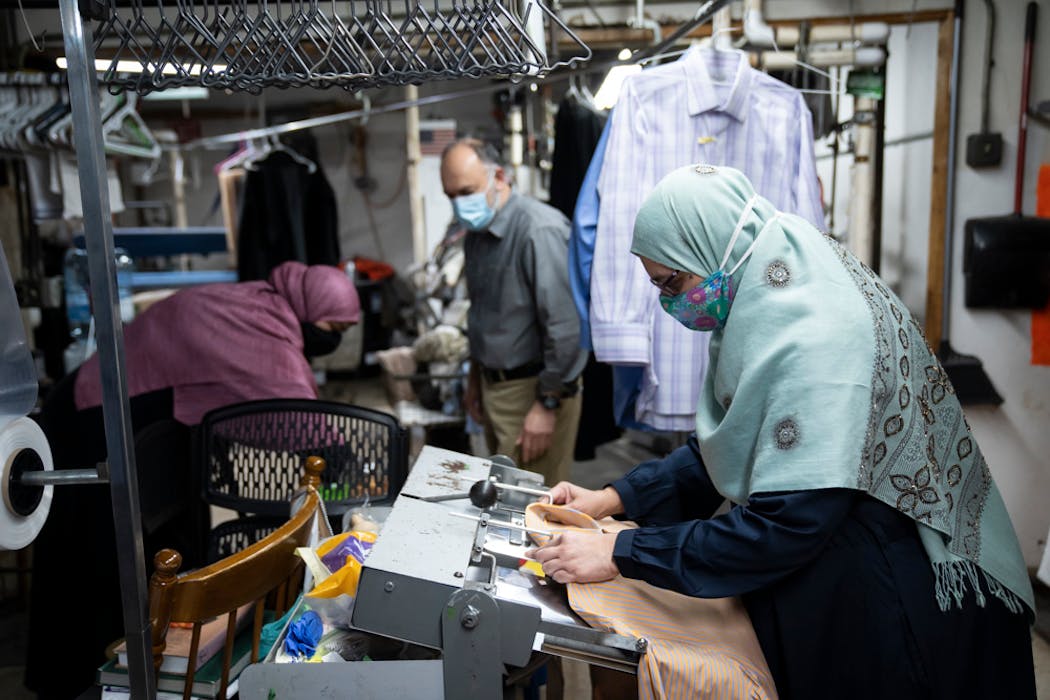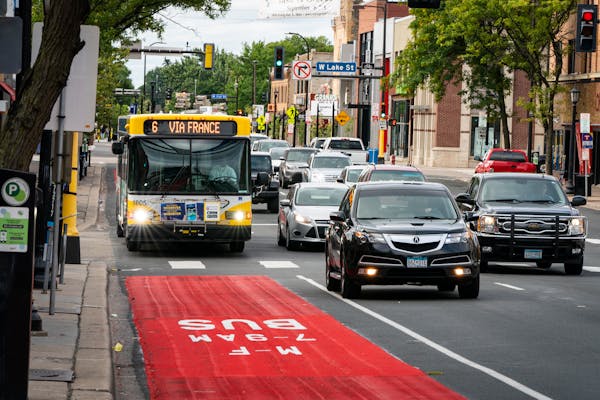Business owners along Hennepin Avenue in south Minneapolis, desperate to save their parking spots and possibly their livelihood, have sent a letter to city officials pleading for them to take their concerns into account before approving plans for the street's first major makeover since 1957.
The recommended plan calls for slimming the bustling corridor to one travel lane in each direction. Both would eliminate 90% of curbside parking spots and use the space to put in dedicated bus lanes, a protected bike lane, wider sidewalks and a center median for most of the corridor to improve safety by limiting left turns between Lake Street and just north of Franklin Avenue.
The city accepted comments on a final recommendation through Friday, and business owners have a lot to say.
"It's going to be a disaster, a failure," said Mumtaz Osman, who owns Osman Cleaners, a fixture at 2500 Hennepin Av. for more than 30 years. "We get customers that drive 10 to 12 miles to come to [us]. If there is no parking, they will not come."
Controversial plans to redo Hennepin have been in the works for more than three years and the redo has been one of the most challenging the city has ever undertaken, project manager Becca Hughes said last month. The plans conform with the city's Transportation Action Plan and Complete Streets policy to reduce the city's carbon footprint and make corridors multi-modal, but still needs the support of the City Council.
Business owners say they have largely been shut out of the design process, and that is why 100 of them signed a letter pushing back and delivered it to Mayor Jacob Frey, City Council members and the city's public works department, said Jill Osiecki Gleich, executive director of the Uptown Association.
"Without significant modification, this project will adversely affect the entire Uptown community, threaten the viability of small and independent Uptown businesses and their employees and visitors, burden residential taxpayers, and provide yet another barrier to having an Uptown that can function as a vibrant commercial area," the letter sent Thursday states. "We should be finding ways to make it easier to conduct business in the City of Minneapolis, not harder."
A city spokeswoman said Minneapolis has 3600 parking spaces located within surface parking lots, parking ramps and on side streets within one block of Hennepin Avenue. The city has worked collaboratively with the businesses and a district parking solution to offset the reduction will be developed and "we fully expect that our work with the business community will continue through design, construction and beyond," the spokeswoman said.
Jeff Herman, president of Urban Anthology, a commercial real estate firm, disagrees. He points to what happened after the city rebuilt Hennepin between Lake and 31st streets three years ago. Many small businesses have struggled ever since and others like the Apple store have closed leaving thousands of square feet of retail space vacant, he said.
"I can't lease my space," said Herman, who is now holding several unrented properties. "This is what is going to happen when you take parking away. Without it, they [businesses north of Lake Street] are all going to die."
Judy Longbottom, who runs a UPS store at 28th and Hennepin, said after COVID, on-street parking is even more critical as many people's routines have changed. People want quick parking for errands and to pick up dinner and take their meals home, she said.
"These are not just 200 spots, they turn over six or eight times a day," Longbottom said. "We are terrified about the reduction in parking. Please hear our cries. There has to be some kind of compromise."
Newly elected City Council Member Aisha Chughtai, who represents the ward where the project will take place, said she has heard the cries and will relay them to the public works department.
"I take the inquiries my office receives very seriously," she said in a statement.
From the outset, the city has been clear that parking would be reduced and last month Hughes, the project manager, said street parking is no longer a high priority. The project with all its complexities has been pushed back a year, to 2024, to gain more time to finalize it, she said.
Osiecki Gleich said current designs also would threaten the future of the Uptown Art Fair.
"It is too expensive to shut down Hennepin for three days and only have the use of one side of the street," she said. "It's not that easy to just change the footprint."
Herman said he is sounding the alarm because what happens on Hennepin could be a harbinger of what happens on other corridors in the city.
"If they do this on Hennepin, what is next? Lyndale? Nicollet? That is what is next," he said. "I am stuck with this, so I am speaking up for others. Stop and do what is right and listen to the businesses. Pedestrian-friendly does not mean no parking."
Correction: A previous version of this article said two plans were being considered.

Want to share info with the Star Tribune? How to do it securely

'Safe recovery sites' would offer syringes, naloxone and more to people using drugs. The plan could be in peril.
New Minnesota GOP leaders seek peace with party's anti-establishment wing

Who is Republican Lisa Demuth, Minnesota's first House speaker of color?



